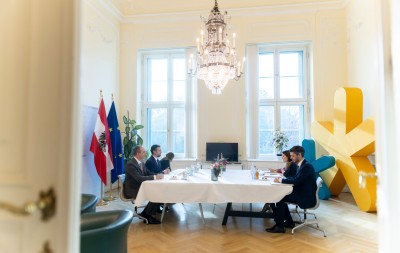Western Balkans Youth Summit 2022 Held in Vienna
Young people in the Western Balkans should be given a perspective, which is why the Western Balkans Youth Summit was held in Vienna at the Austrian Federal Chancellery. For the Austrian hosts, it is clear that the European Union is not complete without the Western Balkans.
 Federal Minister Karoline Edtstadler (2nd from right) together with State Secretary Claudia Plakolm invited to a Youth Western Balkans Conference. In the picture with the Minister of Youth from Kosovo, Hajrulla Çeku (2nd from left). / Picture: © Bundeskanzleramt (BKA) / Andy Wenzel
Federal Minister Karoline Edtstadler (2nd from right) together with State Secretary Claudia Plakolm invited to a Youth Western Balkans Conference. In the picture with the Minister of Youth from Kosovo, Hajrulla Çeku (2nd from left). / Picture: © Bundeskanzleramt (BKA) / Andy Wenzel
Minister for European Affairs Karoline Edtstadler and State Secretary for Youth Claudia Plakolm used the closing event of the European Year of Youth in Vienna to organize this conference with participants from all 6 Western Balkan countries. The event ended with the signing of a joint "Vienna Western Balkans Youth Summit Declaration".
For Austria, the Western Balkans are of a special, partly historical, importance. Austria promotes a rapid European integration of the Western Balkans, especially since the war in Ukraine, it is important to strengthen European Union relations with the direct Southeast European neighborhood to counteract the influence of Russia.
"The mission is very clear: we have to include the Western Balkans when we talk about the future of Europe", stated Minister for Europe Karoline Edtstadler on the occasion of the Western Balkans Youth Conference in Vienna.
"The European Union is not complete without the 6 Western Balkan states. We need to support them, give them a credible perspective and make up for the loss of trust we have suffered as the European Union," Edtstadler said. Given the threats from outside, this should not happen in small steps either, she added. "It is time to stand together," Edtstadler stressed.
She added that it was important to also involve young people here, to reach out to them, because young people in the Western Balkans in particular believed in a future in the European Union. "This is our chance to take big steps forward here," the Minister for Europe concluded.
Youth in the Western Balkans are plagued by poor prospects and youth unemployment. Many young people in the Balkans are moving away and seeking new hope in the European Union. In Austria, especially in Graz and in Vienna, many young people from the Western Balkans come to study. It is necessary to pay more attention to the young people of the Balkans at the Western Balkans Youth Conference.
"It is right to end the European Year of Youth with the future, namely with the Western Balkans. That is why I am pleased that we have launched a Western Balkans Youth Summit for the first time," Youth State Secretary Claudia Plakolm held at the Federal Chancellery. "It is extremely important that we give young people in the Western Balkans a strong perspective because one-third of young people professionally say that they have a strong desire to emigrate. Because of the disenchantment with politics, we as the European Union have to become more careful with our promises," Plakolm said. "Those who meet the conditions must become candidates immediately and not have to wait in the anteroom for the next good weather."
"We and the Western Balkans: that's one team - it's just that some people are still missing their players' licenses. We have to work on that together," the youth state secretary explained.
The war in Ukraine had led to a certain rethinking, because before that Austria had been somewhat ridiculed for its commitment in this area. Now, however, it is clear that everyone on this continent must pull together. "With young people, small steps are already showing, for example in the mobility projects of the European Union, through which you can get to know the continent better, which is only possible by experiencing it together. We must also create awareness among our youth in Austria of the new opportunities that EU enlargement will open up in the Western Balkans," Claudia Plakolm emphasized in the conclusion.



